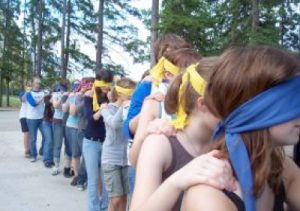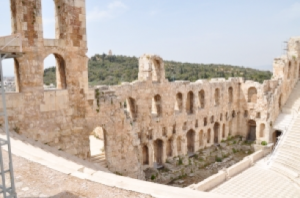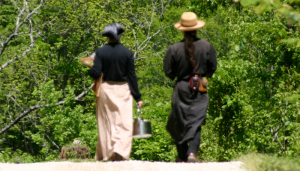
by jphilo | Nov 4, 2011 | Church Newsletter Columns

On that day, the Lord will protect the inhabitants of Jerusalem,
so that the feeblest among them on that day shall be like David,
and the house of David shall be like God,
like the angel of the Lord, going before them.
Zechariah 12:8
Sometimes, the book of Isaiah baffles me. Even with Tim’s illuminating sermon series this past year, I can’t wrap my head around the sheer number of prophesies and promises it contains. When the major prophet overwhelm me – and that happens frequently – I retreat to Zechariah. I’ve nicknamed the fella Little Isaiah. Or the Reader’s Digest condensed version of Isaiah. Or Isaiah Cliff Notes.
As in Isaiah, the most well-known Zechariah verses are Messiah prophecies. In chapters 2 and 9, God promises to come and dwell in the midst of Jerusalem. A future ruler, both priest and king, is described in chapter 6. His future restoration of Jerusalem and rule of peace are described in chapter 8, along with some funky details about his second coming – something else I can’t easily wrap my head around.
But my favorite verse in Zechariah is not a Messiah prophecy. My favorite is Zechariah 12:8. a verse of such great promise and comfort, I can’t quite picture its fulfillment. When I read the words, my mind whirs with questions. How in the world will the feeblest of God’s people – people like my dad who spent 14 years in a hospital bed, or tiny, little babies in neonatal intensive care units – be as strong as David, the richest, most powerful king in Israel’s history?
This verse also promises the house of David will be like God. (Notice it says they’ll be like God, not that they will be God. Kind of like those really good Elvis impersonators. They can’t match the king, but their presence makes onlookers appreciate how good he was.) How will the house of David become enough like God to make people appreciate Christ’s goodness?
My ponderings always lead to the same conclusion. David was a man after God’s own heart. His faith was strengthened by the experience of God at work in his life rather than by the strength of his army or great wealth.
The same can be true for us. As we submit to God’s will rather than championing our own, God fulfills his prophecies and promises within us, and our feeble faith is transformed. We become men and women after God’s own heart. We become more and more like God. Our lives and actions become a glimmer of his glory, a fragrant aroma of Christ drawing the lost to into the kingdom of God.
That’s a vision I can wrap my head around, a vision I am eager to witness, a vision where God works in and through me. It’s the vision of Isaiah. It’s the vision of Zechariah. It’s the vision of all who desire to be men and women after God’s own heart.

by jphilo | Oct 6, 2011 | Church Newsletter Columns

And he said, “Lord, I believe.” And he worshipped Him.
John 9: 38
The other day, Hiram was backing my Toyota out of the garage and commented, “Your car has a couple bad blind spots.”
I nodded in agreement. My little car is easy to drive, but it has some nasty blind stops. Only by remaining constantly aware of them can I keep from being a menace on the road.
As it turns out, even thought I’m not a mechanical kind of gal, the car and I have blind spots in common. And here’s the disturbing thing. While I’m well-aware of the car’s blind spots, God keeps revealing more of mine with every passing year.
Maybe that’s why I like reading John’s account of how Jesus healed a young man who was blind from birth. Turns out, I’m in good company. Every person in the story, save one, is riddled with with blind spots.
The disciples reveal theirs when they see the blind man and ask Jesus who sinned, the man or his parents. The neighbors blind themselves to the young man’s healing, arguing that this seeing fellow only looks like the sightless guy. The Pharisees are blind to the truth, refusing to believe Jesus is divine because he doesn’t fit their preconceived notions of how the Son of God should act. The man’s parents are blinded by fear of being thrown out of the temple.
The only person without a blind spot is Jesus. He goes from one unseeing wretch to the next, shining his word of truth into the center of their darkness.
“No,” Jesus tells the disciples, “this man’s blindness wasn’t punishment for sin. It was allowed so God could use it to display his good work.”
“Yes,” Jesus tells the blind man, “I can use what you consider disgusting – mud and spit – to make you see.”
“You,” he tells the man whose sight was restored, “have seen the Son of Man,” “and he is talking to you.”
“You,’ he tells the Pharisees, “refuse to admit you have blind spots, so your sin remains.”
“Your sin,” Jesus whispers when he shines his light on my blind spots, “doesn’t have to keep you from relationship with me. I can use your imperfections and the messes in your life to display my glory. Just admit your sin, turn away from it, and follow me.”
Blinking in the light of his Word, I respond again and again, year by year, fear by fear, doubt by doubt, weakness by weakness, as the once blind man did long ago.
“Lord, I believe.” Then I bow before the Word made flesh, and worship the Light.

by jphilo | Sep 2, 2011 | Church Newsletter Columns

And his daughter was Sheerah,
who built lower and upper Beth-horon, also Uzzen-sherah.
1 Chronicles 7:24
A couple weeks ago, my read-through-the-Bible-in-a-year plan assignment was in 1 Chronicles. Usually, forays in Judges, Joshua, Samuel, Kings, and Chronicles are right up my alley since I’m a history buff. But the first nine books of 1 Chronicles consist of pages and pages of genealogy. Talk about a yawner!
Still, this dedicated rule follower slogged through each day’s assignment. Well, I maybe, kinda, sorta skimmed through the verses instead of reading them carefully. But even so, one verse in the guy stuff genealogy of Ephraim in 1 Chronicles 7caught my eye. According to verses 20-24, enemy raiders killed Ephraim’s sons, and he went into a deep depression. It took a whole lot of help from friends and family to snap him out of it, but eventually he rejoined the world. And eventually, another son came along. Then, at the very end of all the guy stuff, the writer added a verse about Ephraim’s daughter, Sheerah. You remember Sheerah? She’s the daughter who built some cities.
The daughter who built some cities?
What kind of Old Testament genealogy verse is that? Usually only guys are mentioned in the who begat who begat who. Women rarely make an appearance, though Rahab the harlot and Ruth, the great-grandmother of David get an occasional nod. But the accomplishments of women are rarely mentioned, so rarely that the ones in print deserve some attention. No wonder the passage grabbed my attention and the questions started rolling.
Who was Sheerah? What talents and abilities and education did she have? How did she find courage to build cities in an ancient, patriarchal culture? Who mentored her? Who encouraged her? Why did she do it?
A search through several Bible commentaries yielded no answers. But I couldn’t stop thinking about Sheerah and her accomplishments, sparkling gems recorded in Scripture because the presence of these little jewels has implications for women today, including women at GCC. If God raised up Sheerah to build cities in an ancient culture not known for championing the rights and abilities for women, how does he raise up women in our day and age to impact our world? How can women hone their talents and abilities so they’re prepared to advance God’s kingdom? How can they express themselves creatively to the glory of God?
This fall’s GCC Women’s Ministry Conference, Expressing Christ, will be a day dedicated to exploring and answering those questions. It will be filled with food, music, artistic expression, and fellowship designed to get your creative juices flowing. So women, mark your calendar for Saturday, October 15 and join the ranks of the remarkable women God is raising up to do His work.
Sheerah the city builder is one of them.
And so are you.

by jphilo | Aug 1, 2011 | Church Newsletter Columns

Do not neglect to show hospitality to strangers,
for by this some have entertained angels without knowing it.
Hebrews 13:2
Riding a bike is one of my not favorite things. Being outside on a hot July day is another of my not favorite things. Along with sweating, being windblown, sleeping in a tent, and using a port-a-potty. So when the Des Moines Register announced that our town would be an overnight stop along the July 2011 Register’s Annual Great Bike Ride Across Iowa (RAGBRAI), I was underwhelmed. In fact, my exact thoughts ran along the lines of Oh great, there will be 30,000+ crazy people in our town overnight, followed by If I lie low, maybe I can avoid contact with them.
My strategy worked perfectly until two weeks before the big day, when a neighbor asked if any RAGBRAI riders were staying with us. If not, four friends of their friends were looking for a place to spend the night. Were we interested? Suddenly, the first answer that came to mind – No, we’re not interested in having strangers crazy enough to ride their bikes across Iowa in the middle of July stay at our house! – sounded a little inhospitable.
Then I thought about all the families who have invited me to stay at their homes when I travel for speaking engagements. Maybe traveling around the country is one of their not favorite things. Maybe speaking to groups of strangers is another of their not favorite things. Along with hauling boxes from here to there, selling books, and wondering if there’s a booger hanging out of your nose.
Maybe they think I’m crazy. Even so, they open their homes to me. We begin the evening as strangers, but then we start talking and discover common acquaintances, common interests, common heartaches, and common joys. They may still think I’m crazy when we say good-bye, yet they send me off with a hug and a prayer. Surely, after being on the receiving end of so much hospitality, it was time for me to offer some, instead.
Sure, I told my neighbor, send them this way. Turned out, our four house guests were hot, sweaty, windblown, hungry, and tired. But the Davenport natives – a high school English teacher, a school development office worker, and a mental health counselor – and the IT guy from Australia weren’t as crazy as I’d thought. They were young people grateful for comfortable beds, hot showers, home cooking, and conversation in air conditioned comfort.
Hiram and I waved good-bye to our guests the next morning. And I wondered why I’d been reluctant to share God’s riches with strangers in our town, why I had almost disobeyed his command, why I hadn’t trusted his promise in Hebrews 13:2.
Crazy. I shook my head. Crazy how hosting bike-riding strangers has become one of my favorite things.

by jphilo | Jul 1, 2011 | Church Newsletter Columns

Yet those who wait for the Lord will gain new strength;
They will mount up with wings like eagles,
They will run and not get tired,
They will walk and not become weary.
Isaiah 40:31
A few weeks ago, our senior pastor issued a challenge during his biographical sketch sermon about Dietrich Bonhoeffer. The challenge was to meditate on the same verse of scripture daily for a week, like Bonhoeffer did. The pastor called it “mining the verse for hidden riches.” I took up the challenge and chose to meditate on Isaiah 40:31, not really expecting to find any gold nuggets.
But on the first day, I hit the motherlode while exploring this question: What does it mean to wait upon the Lord? The image of a restaurant waiter came to mind, and in an instant, my definition of waiting changed. Waiting was no longer a passive act. It was active. Because waiting is serving. And serving is a form of waiting.
I didn’t want to explore this vein of thought any further. I liked it better when my waiting on the Lord was passive. When I could pray and read my Bible and wait for God to tell me what to do, arrange all the particulars to make it happen, and then do my small part without working too hard.
I didn’t want waiting on the Lord to be active. I don’t want it to be a call to pray for ways to serve. A call to read my Bible and then follow Christ’s example of service. A call to look for ways to serve instead of waiting for God to drop them in my lap. A call to arrange things so his work could move forward. A call to do things that are new, hard, uncomfortable and make me sweat.
I didn’t like this new definition of waiting on the Lord, and maybe you don’t either. Because it doesn’t let us off the hook. It doesn’t let us ignore bulletin announcements about helpers needed for soccer camp. It doesn’t allow for excuses like, “I can’t volunteer to help with slides for Sunday morning, because I’ve never done them before.” In fact, the second half of this verse silences any doubt about personal abilities, any pleas of inadequacy. It promises the strength to soar to new heights and boundless energy for those who actively wait upon the Lord.
This verse about waiting on the Lord is a call to service. A call to wait expectantly, a call to read the bulletin and volunteer when we can. A call to recognize unseen needs and meet them when we’re able. A call to act when we’d rather wait for someone more qualified, more equipped, or more experienced to fill the gap.
This verse is about expecting God to give us strength to soar when we step forward to serve. This verse is about trusting God to fulfill his promises through us when we serve. And if the promises in this verse are true, they beg a hard question.
What are we waiting for?

by jphilo | Jun 1, 2011 | Church Newsletter Columns

Love bears all things, believes all things,
hopes all things,endures all things.
Love never fails.
1 Corinthians 13:7-8
The “if onlys” can get to a person, and they almost got to me the Sunday our youth pastor taught about how parents can help their children discover God. As he explained misconceptions to avoid and understandings parents should develop, I caught myself thinking, “If only we’d known this when our kids were young.” And when he got to the four application points –
- Help kids recognize sin and their need for Christ to overcome it.
- Pray for God’s grace in their lives.
- Model your faith.
- Look for signs of true transformation.
– well, it was all I could do to not “if only” away the rest of the day.
But, what’s past is past, and all the “if onlying” in the world won’t change how we parented our kids. So I pushed away the “if onlies” and concentrated on a different thought: Did our years as parents yield other application points to pass along to help other parents right now?
Lo and behold, the answer was yes. This point is known to parents who faithfully followed numbers 1 – 4, but whose children haven’t yet embraced God’s grace –
- Love your child no matter what. Forever and always.
My commitment to this step was tested when our son moved across country, converted to a denomination foreign to us, and later entered the seclusion of a monastery.
“But they’ll only let us call him once a month, and we can only see him once a year,” I wailed to a wise man who didn’t use our son’s choices to judge our parenting success. “And he never gets to come visit us. What kind of relationship is that?”
“It’s the only one you’ve got,” answered our senior pastor, the master of practicality. “And you nurture it by calling once a month and visiting once a year.”
Following that advice, we loved our son. No matter what. Forever and always. One phone call a month. One visit a year. We also prayed for God’s grace in his life. We modeled our faith. We looked for signs of true transformation. After six long years, God worked a miracle and our relationship with our son was fully restored.
But not every family’s story has a happy ending. Some children remain estranged. Parents blame themselves for their kids’ choices. Though they parented well and faithfully, they feel like failures. Hurt piles upon hurt. And still, they are called to love their children. No matter what. Forever and always.
Impossible, but for this truth. Christ died for sinners. And he would have done so had all mankind rejected him and refused his grace. Because a man’s choice is not God’s failure. God’s love remains. His promises wait for sinners until their last breath.
He is a parent who loves his children. By his example, we can love our children. No matter what. Forever and always. Until our last breath.







